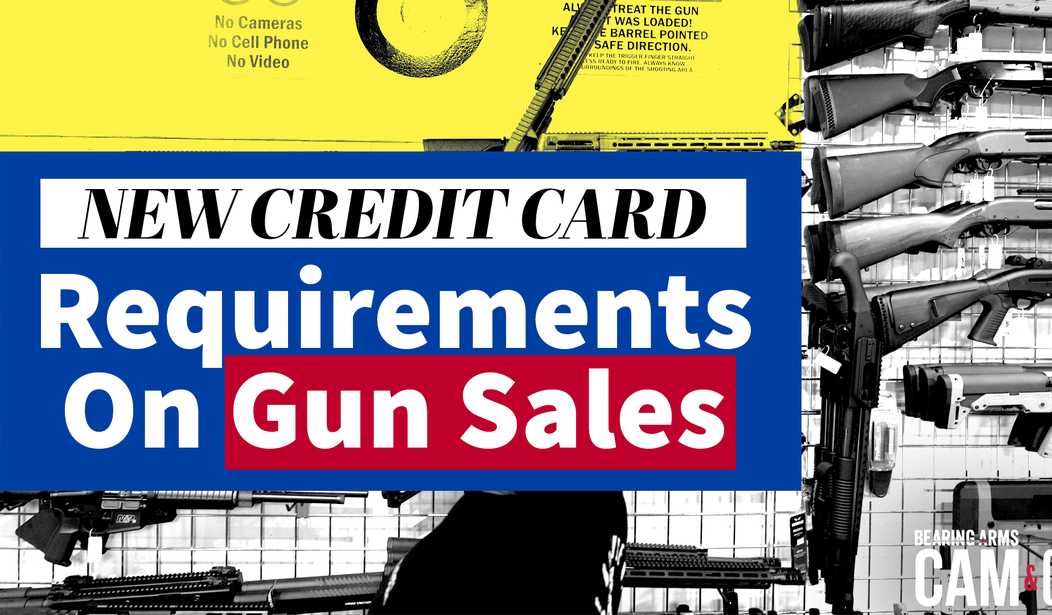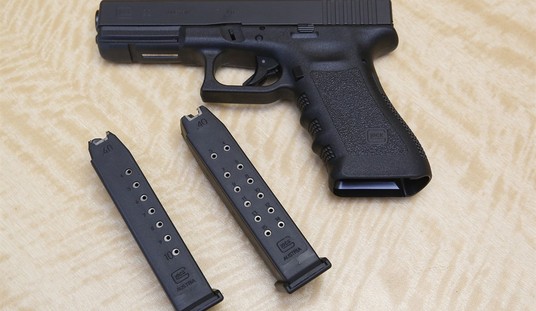From small town gun stores to the halls of Congress, the complaints and questions are growing over new rules adopted by credit card companies that could lead to a back-door gun registry. On today’s Bearing Arms’ Cam & Co we’re highlighting a few of those voices, but also raising one very big question about the new rules that gun control advocates have, so far, been unable to answer.
In Brownsburg, Indiana, Premier Arms CEO Bryce Curry says customers have been asking what the new rules mean for them, and he worries that innocuous purchases could soon be seen by credit card companies as something to be flagged for law enforcement to investigate.
Curry said some of his customers already have voiced their displeasure with the move. He said about half of his sales involve items other than guns or ammunition, such as sights, scopes, holsters and other accessories.
“If somebody comes in and spends $10,000 on every holster known to man, then are you going to flag somebody as buying $10,000 worth of firearms?” Curry said.
Even within the firearm category, Curry said there’s a lot of potential for error. His inventory includes antique firearms that in some cases predate the Civil War. Those tend to command high prices and collectors often buy multiple such firearms. Curry said such collectors could unknowingly trigger some sort of action through such purchases.
This is why gun control activists won’t be satisfied with the actions announced by Visa, MasterCard, and American Express. Under their theory that crimes can be prevented if “suspicious” gun purchases are flagged by these companies, the companies will understandably need to know exactly what was purchased in order to determine whether or not the transaction is deserving of extra scrutiny, and that’s where the backdoor registry comes into play.
Rep. Thomas Massie (R-KY) and Crime Prevention Research Center president Dr. John R. Lott highlight that potential private gun registry in a piece at Newsweek, pointing out that gun registries have no real benefit in terms of reducing or preventing crimes. The pair also have questions about what exactly a “suspicious” purchase will look like.
Given that gun buyers who use credit cards have already passed background checks to see if they can legally buy guns, what “suspicious” activities could credit card companies possibly look for? Is buying two or three guns evidence of suspicious activity? The majority of mass public shootings since 1998 only used one gun. Do you look for people who buy AR-15s, America’s most popular rifle? Put aside that even the Associated Press now recognizes that these aren’t “weapons of war” and are no different than other hunting rifles, only rarely do mass public shootings involve rifles and no other type of firearm.
Should we be suspicious if someone purchases a couple hundred rounds of ammunition? People can easily use that many rounds at a shooting range in an afternoon.
The new codes won’t specify what was purchased at a gun store, at least for now, but it won’t be long before gun control activists demand that information be included as well, again with the ostensible goal of preventing violent crime.
Lott and Massie raise an important point: even if the particular purchases of a gun store customer are available in detail to credit card companies, how will those companies determine whether or not a given purchase should raise red flags? Presumably each “suspicious” purchase is going to be referred to law enforcement; but neither local departments or the FBI can go off on tens of thousands of wild goose chases just because someone bought an AR-15 or more ammo than a Visa employee thinks is appropriate.
There’s no real investigative value to these new codes, but they have proven to the gun control lobby that they can get these major corporations to bend to their demands, which means we’re likely to see more. The big question, at least for me, is whether these anti-gun groups will take the smaller step of asking these companies to catalogue specific purchases at gun stores, or go big and try to pressure Visa, Mastercard, American Express, and others to stop allowing their customers to use their cards at gun stores altogether.








Join the conversation as a VIP Member